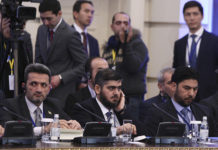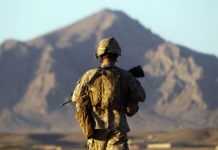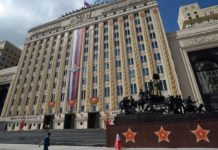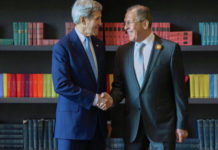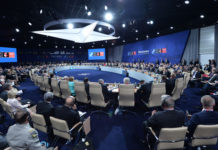Interview of Deputy Secretary of Security Council Mikhail Popov
This year, the Security Council of Russia turns 25 years old. It was established according to a decree of the President on June 3 of 1992. Organization of defense of the country, formation of domestic, foreign and military policy in the field of security were named the most important lines of activity of this constitutional consultation body from the start. Deputy Secretary of the Security Council Mikhail Popov speaks about transformation of this activity in contemporary conditions, as well as about the measures taken for prevention of threats and dangers of military nature.
Question: Strategic documents in the field of defense and security were revised in the last five years with direct participation of the Security Council. What has caused such tectonic changes and on which plans of defense development of the country are based now?
Mikhail Popov: Taking into account changes of the nature of military dangers and military threats, a new revision of the military doctrine of Russia was developed in 2014. The new doctrine corrected the military dangers and military threats to Russia, the tasks of deterrence and prevention of military conflicts. Tasks were outlined respectively for the Armed Forces, other troops, military formations and bodies, as well as tasks of military economic provision of defense of the country and in the field of mobilization preparation and mobilization.
The concept for building and development of military organization of Russia was approved by a decree of the President in September of 2015. The basics of state policy of Russia in the field of civil defense for the period until 2030 were debated and approved in 2016. The maritime doctrine of Russia and provision on military planning were also developed with direct participation of staff of the Security Council.
Plans for building and development of the Armed Forces, other troops, military formations and bodies for the next planned period were developed on the basis of these documents and approved. For example, the plan for defense of Russia for the period between 2016 and 2020 was developed last year in the interests of consolidation of efforts of state power bodies and was put into operation since January 1 of 2016 by a decree of the President.
Question: Which of provisions of the adopted strategic documents already entered the stage of implementation? How did this influence the combat capabilities of the Russian army?
Mikhail Popov: In accordance with the resolutions adopted by the Security Council, development of strategic missile forces is done in a priority way. Rearming of formations of the Strategic Missile Forces continues. For example, this is transition to new missile systems Yars, arming of the maritime strategic nuclear forces with strategic submarines of Borey project, modernization of strategic missile-carrying airplanes Tu-160 and Tu-95MS of the aviation strategic nuclear forces.
Combat capabilities of military formations of the Ground Forces are increased due to supply of new models of armament and military hardware. Along with this, the level of equipment with modern armament and military hardware is increased to 42%. Potential of the Navy grew because of inclusion of surface ships and multipurpose submarines of a new generation into the combatant ranks.
Unmanned aviation received qualitative development. Thirty-six military units and formations of unmanned aviation were formed, they were armed with 2,000 modern unmanned aerial systems.
Supplying of the Armed Forces, other troops, military formations and bodies with modern models of armament and military special hardware continues at the planned speed. According to results of 2016, equipment of the Russian army with modern models amounted to 58.3%.
Question: Which other areas of comprehensive supply of the Armed Forces does the Security Council attribute to priorities that require close attention?
Mikhail Popov: We consider the matters of further improvement of the system of military science and military education to be important. For example, at operational meetings the Security Council adopted resolutions aimed at creation of an advanced network of military higher educational institutions for steady manning of the Armed Forces with highly professional military staff.
The military educational institutions are supplied with modern information methodical and material technical means. As a result, we formed an “electronic higher educational institution,” completed the pilot project “electronic libraries” We are creating a service of exchange of information among the educational institutions. The quantity is increased and geography is broadened with regard to the foreign servicemen and specialists who study in educational institutions of the Defense Ministry.
Security Council pays serious attention to improvement of military patriotic upbringing of citizens. DOSAAF and Russian Military Historic Society are involved into fulfillment of these tasks and material base of the defense and sport camps and military historic clubs is used. All-Russian children’s and youth military patriotic public movement Young Army was created in 2016 for the purpose of upbringing of the growing up generation relying on historic, spiritual and military traditions of the regions.
Special attention is paid to matters of social protection of servicemen. Thus, money allowances were significantly increased in the framework of the resolutions approved by the Security Council. Permanent housing is being built and housing subsidies are allocated for its purchase. Development of the accumulation mortgage system continues. More than 21,000 servicemen became its participants.
Question: Defense industrial security of the country acquires an equally big importance in conditions of the current economic situation and Western sanctions. Which measures are taken now for its provision?
Mikhail Popov: Security Council plays the key role in making of decisions in the field of provision of military industrial security.
Formation of state policy in the military technological and defense industrial area, detection and analysis of threats to national security, as well as direct participation in legislative activity, development of documents of program targeted planning in accordance of which resolutions adopted on the supreme level are implemented in practice are in the zone of responsibility of the Security Council.
For example, work of organizations of the military industrial complex on creation of domestic counterparts of hi-tech products of foreign production was activated in conditions of implementation of sanctions against Russia by some Western countries. Institutions of general designers, as well as heads of priority technological lines were created for development of new and advanced models, complexes and systems of armament and military and special hardware and for development of innovative technologies.
Question: Despite all attempts of isolation, Western countries do recognize the important contribution of Russia to solving of international security problems, for example, in efficient combating of terrorism in Syria. How does the Security Council estimate participation of Russian Aerospace Forces in this operation?
Mikhail Popov: Security Council discusses matters of global and regional security regularly. However, the problem of combating of international terrorism that acquired unprecedented scale and actually threw a gauntlet to the civilization was naturally put into the focus of attention.
Russian decision to send the Aerospace Forces to Syria in responsible to the request of authorities of this country was dictated by clear understanding of a need to prevent development of a terrorist threat. Staff of the Security Council highly appreciates the actions of the Russian group of forces for combating of terrorism coordinated with the governmental forces. They incurred significant damage on the international terrorist groups in Syria, contributed to radical change of the situation and created favorable conditions for promotion of the inter-Syrian dialog in the interests of provision of political regulation of the conflict.
Long-range, operational tactical and army aviation, ships and submarines were used in the unique operation. Strikes were delivered for the first time by precision-guided airborne and maritime cruise missiles at a distance of up to 1,500 kilometers. Modern and modernized models of armament, military and special hardware were tested in the course of combat operations. Prospects for their further improvement and modernization were determined according to results of the testing.






